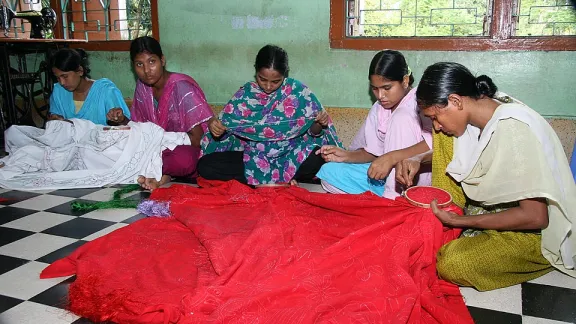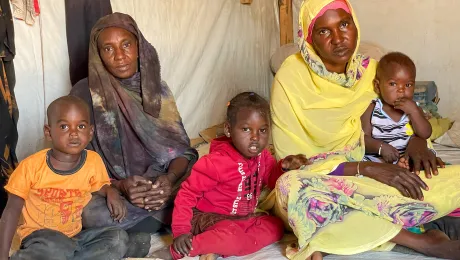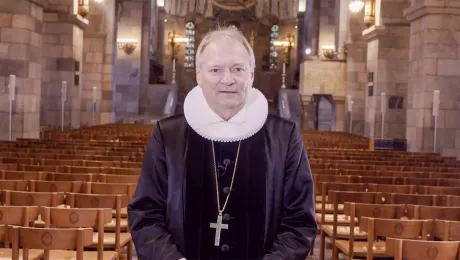
Girls and women rescued from human trafficking or other forms of violence receive skills training in tailoring and hand embroidery at the RDRS rehabilitation center in Rangpur, northwest Bangladesh. © RDRS Bangladesh
LWF-Supported Center Helps Victims of Human Trafficking in Bangladesh
On 29 January 2010 Ranjona and her cousin Pinky went to visit the holy site Majar Sharif at their village in Dinajpur district, northwest Bangladesh. At a sudden point during the visit, they found themselves surrounded by a group of people. They were knocked unconscious.
When the teenagers regained consciousness they discovered they were being held captive in a strange house by a couple they did not know. For the following weeks, the two young women were forced into sexual work.
Ranjona soon learned that she was to be sold off to another woman in Faridpur district near the capital Dhaka, where the forced sex work continued. Back home, her parents—her father is a vegetable vendor, her mother a housewife—had reported the girls’ disappearance to the police.
Help eventually came when Ranjona gave her father’s name to a vegetable seller who had noticed her through a window of her “owner’s” home. Police raided the house and rescued her. The rescue subsequently led to Pinky’s freedom as well, and arrest for the offenders. This was after two months of sexual captivity for both girls.
A Rural Rehabilitation Center for Destitute Women
Ranjona’s parents knew about a rehabilitation center for destitute women run by the Rangpur Dinajpur Rural Services (RDRS), one of Bangladesh’s longest-serving and largest NGOs and a lead actor in rural development.
Started by The Lutheran World Federation (LWF) in 1971 as a country program of the Department for World Service (DWS), RDRS, now an associate LWF program, has continually challenged the causes and effects of poverty, ignorance and powerlessness in Bangladesh, with particular focus on women’s empowerment.
At the RDRS rehabilitation center in Rangpur, Ranjona and Pinky were offered counseling, primary health care, legal education and skills training. Despite the harrowing experiences at the hands of traffickers, they were able—with RDRS’ assistance—to return home to their families with support and training to help them earn a living on their own.
The young girls are among millions of women and men, boys and girls, who have been subjected to human trafficking in Bangladesh, a country of more than 160 million people. According to the International Organization for Migration (IOM), trafficking in persons, including the trafficking of women and children for sexual exploitation is a major national and regional concern.
But it is rooted in a broader context. Extensive migration of workers necessitated by poverty spawns not only legitimate work but also illegal activities that threaten the poor and vulnerable. “Irregular migration, informal channels of remittance and human trafficking continue to result in serious violations of migrants’ rights, and an increasing number of Bangladeshi irregular migrants are apprehended in destination countries,” IOM states.
The RDRS notes that children—both boys and girls—are trafficked in Bangladesh for commercial sexual exploitation, forced begging and labor. Women and girls are trafficked for sex work within the country or sent to India.
A significant share of the country’s trafficking victims are men recruited for work overseas with fraudulent employment offers, and then subsequently exploited under conditions of forced labor, RDRS says.
Job Promises in Neighboring Country
On 5 October 2009 residents in Bhaoalguri village in the northwest district of Kurigram became suspicious when they saw five women and six children wandering in the community. They contacted an RDRS legal volunteer, who determined that the group had come from a village in Faridpur district and had been promised jobs in India by a man they were yet to meet.
Upon consultation with government and police officials, RDRS confirmed that the prospective employer was attempting to traffic them as forced laborers, and he was arrested.
Trafficking persists in Bangladesh but there are efforts by the government to curb the practice and punish offenders. A law enacted in 2011 categorizes human trafficking as a punishable activity. The legal framework has been broadened to include not only human trafficking associated with prostitution and sexual abuse but also internal trafficking for labor. Convictions for offenders range from several years in prison to life sentences.
RDRS continues to address the root causes and effects of poverty, ignorance and powerlessness in the country. Its development programs benefit more than 2.2 million people (400,000 households) in almost 17,000 groups and 360 federations in the mainly deprived northern Bangladesh, particularly Rangpur division.
The federations have become an effective local platform for mobilizing marginalized communities as a positive force for empowerment. The RDRS women’s rights program seeks to reduce discrimination and gender-based violence, which are key concerns for the LWF.
(By Sabrina Sharmin, RDRS communications coordinator)
Overcoming Violence against Women Stories | More on Gender | More on Women


